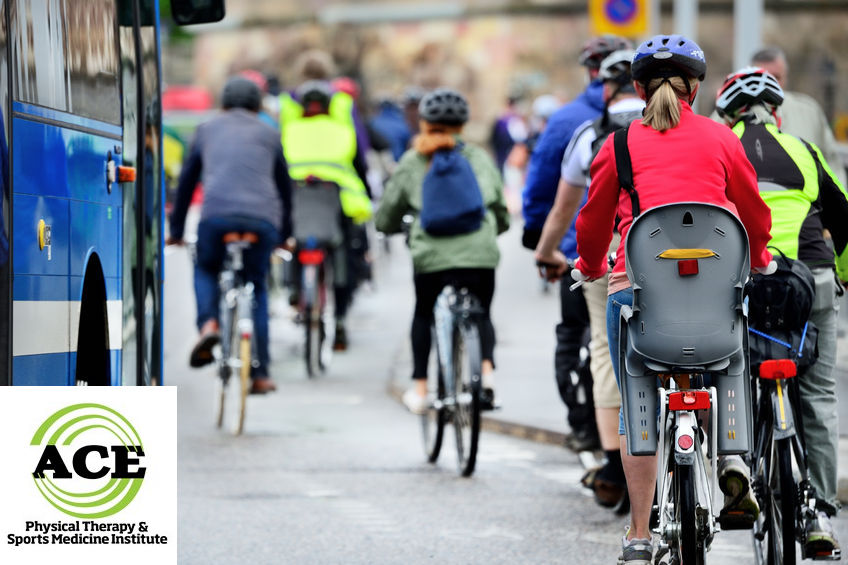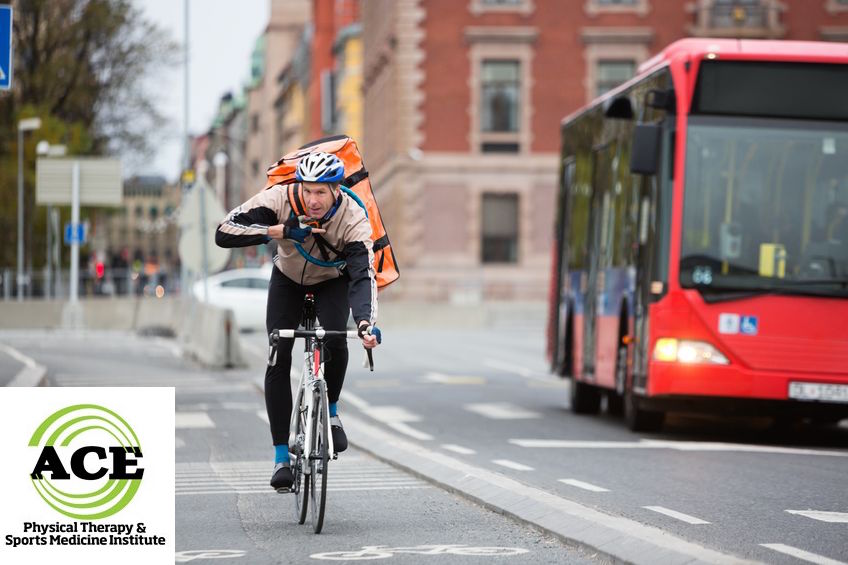BENEFITS OF BIKING TO WORK
Benefits of Biking to Work
by ACE Physical Therapy and Sports Medicine Institute
Tid Bits of Info.
- Local bike shops have experts that can “fit” you to your bike to make the ride more enjoyable and help to avoid an injury.
- Casual speed on a bike is 12-14 mph.
- Casual speed riding for 30 minutes can burn nearly 400 calories on someone who weighs 185 lbs.
- Bike helmets are designed to absorb shock and save your head, but the helmet needs to be replaced after an accident.
- Seek the advice and treatment of a Physical Therapist if you sustain an injury from riding your bike.
Biking to work can be a fun and healthy way to start and end your day. The benefits are obvious: staying fit, burning more calories, saving gas money and even saving the environment. To avoid injury and unforeseen challenges, you should thoroughly prepare and don’t overdo it at the start.
Bike riding can be a great form of exercise. The longer and faster you pedal the more calories you will burn and your cardiovascular system will benefit greatly from a daily ride. If you choose to pedal at a leisurely pace, you can still get some benefits, but they will not be the same as the rider that is pedaling at top speed for most of their commute. This should not deter anyone from riding to work because regardless of the speed and distances that are performed during the ride you will experience the healthy benefits of commuting on a bicycle to some degree.
Preparing to Ride to Work
Some commutes are easier than others. Take time to consider the route you will take to work. Drive the route and watch for any potential challenges along the way. Once your prepared to make the drive, test it on a non-work day when there should be less traffic and no mandatory arrival time.
Choosing the Right Bicycle
Choosing the proper bike and proper size is critical for your safety and enjoyment. There are thousands of brands of bikes on the market, but basically you have to decide if you are going to purchase a road bike that is designed for long distances and high speeds (narrow tires and “curled handlebars”) or a more basic “hybrid” bike that has wider tires, traditional handlebars and can be used “off-road” if necessary. This decision is personal, but if you are riding on paved surfaces the entire distance you should choose the bike that is in your price range, fits you and allows you the most comfortable ride for your style of riding.
Ask a professional at your local bike shop to help fit you to the particular bike. There are a few things critical to the fit that will make the ride more comfortable and hopefully prevent an injury from an improperly fitted bike. The most important aspect of proper fit is the height of the bike, seat or saddle height, and position of the handlebars. If you decide that commuting to work is the best thing for you and you have a significant distance to travel, it would be beneficial to have a through “fitting” so you’re almost every aspect of the bike is customized to your body.
Saddle Height
When measuring for the saddle height, you should put your heel on the pedal and get to the bottom of the pedal stroke, the knee should be fully extended (straight). You should be able to pedal comfortably with no excess hip movement while your heels barely stay in contact with the pedals. When you “clip in,” the balls of your feet are on the pedals, allowing the knee to bend approximately 25 -35 degrees when performing the pedaling motion.
Bike Frame Size And Handle Bar Position
There is a specific formula that can be used to determine the exact height and size of the bike frame. For most riders the easy way to determine if it is going to “fit” is to stand flat footed with the bike between your legs and the frame should make slight contact with your crotch. If you have to stand on your “tippy toes,” the bike frame is too large. If the frame does not touch your crotch, it is too small.Riders that are going to pedal at high speeds will want a more aerodynamic posture on the bike and this will force them to use a handlebar set that is narrow and sleek. This type of handlebar lends itself to less control of the bike but definitely more aerodynamic. Many commuters will choose a wider set of handlebars that enable them to have better control of the bike and allows them to sit more upright. The upright position is more comfortable for most people but not aerodynamically sound.
Riders that are going to pedal at high speeds will want a more aerodynamic posture on the bike and this will force them to use a handlebar set that is narrow and sleek. This type of handlebar lends itself to less control of the bike but definitely more aerodynamic. Many commuters will choose a wider set of handlebars that enable them to have better control of the bike and allows them to sit more upright. The upright position is more comfortable for most people but not aerodynamically sound.
Biking to work can be great and beneficial but injuries can develop or occur. Obviously “crashing” on your bike is always a possibility so always wear a helmet, don’t listen to music, and pay attention. Try to find a route that is less heavily traveled by automobiles and never assume that “drivers will stop!”
If you develop aches and pains from riding, you might want to visit a Physical Therapist for some advice and treatment of your condition. Visiting a Physical Therapist is easy and does not require you to see your doctor or bring a doctor’s prescription. They are licensed, healthcare professionals who specialize in the treatment of musculoskeletal injuries. They will help your get back to your pre-injury status as quickly as possible.
There are numerous benefits to riding a bike to work. Staying fit, burning calories, and saving money are some of the most obvious ones but there are many more. Start slowly and choose a safe route. Be prepared for the workday and plan ahead by taking clothes to work on the previous day and figure out where you will get “cleaned-up” prior to your initial ride. Have fun and be safe and you can enjoy the beauty and benefits of commuting to work on your bicycle.
Read more articles on our main website blog at: ACE-pt.org/blog
Vist our main website at www.ACE-pt.org


